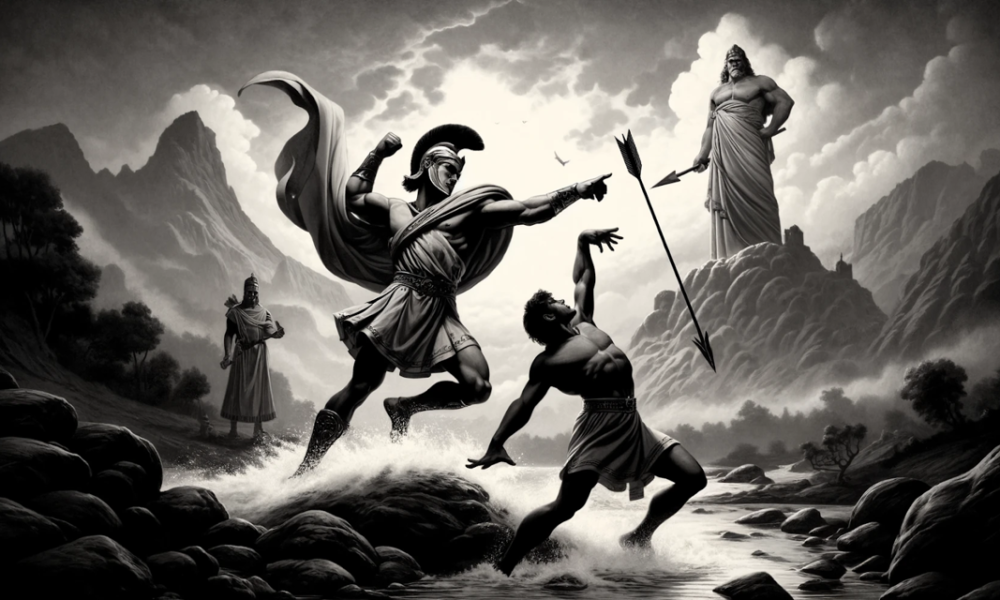
From Achilles to Alphas
How to Become an Ancient Sigma
C. N. Vujanovic
WHAT MAKES HEROES SO SIGMA?
It’s a fair question to raise. The likes of Achilles, Odysseus and more were almost certainly John Wick-esque, but the question is why? Why do we hold up these individuals? Why have societies since the beginning of time (albeit free from the brain rot of Sigma society) held up these individuals with reverence? And more importantly, what can we learn from this Sigma to become more ‘based’ ourselves?
To answer such a crucial question, we have to step back through time to where it all began. Ancient Greece. Yes, that’s right, Assassin’s Creed Odyssey.
Let’s first take a look at Achilles.
Imagine a mother, so concerned for a child that she dangles him headfirst, by the ankle, into the fiercest river in the underworld. The Styx. This mother was Thetis, Achilles’ Mum, who hoped that the holy waters would make him immortal. Yet, in her bid to make him invulnerable, she had left a weak spot – his heel. Now we all know the story, and although he ended up dying with an arrow in the heel, it must be what he did before he died that elevated him to a god-like status.
Reddit user boasts his 50 hour Achilles armour set in Assassin’s Creed Odyssey
In the Iliad, written by the original Homer, Achilles is at the centre of the action. In fact, the very first word of the Iliad begins (in translation), “Sing, Goddess, of the rage of Peleus’ son Achilles”, but in the original Greek, we see Homer has the sentence structure flipped to make Achilles the real Sigma.
Homer Vs. Homer
In Greek it begins, “Μῆνιν ἄειδε θεὰ Πηληιάδεω Ἀχιλῆος” (you’re welcome, I’m sure that is very helpful to you), or to hone in on the first word, ‘mênis’, meaning rage or wrath, we really learn a lot about the character of Achilles. See, the Iliad is not just about a war, but it is the intense emotions that drive individuals to their limits and beyond. Seth Schein, Professor of Classics, explains that his emotion ultimately points to his mortality, and that is what makes individuals heroes.
Schein writes that we see Achilles “move toward disillusionment and death to reach a new clarity about human existence”, not referring to the realisation of the rat race, or of the pervasive nature of over commodification within our society, but of the inevitability and inescapability of his fate.
He is a hero because he chose to accept his fate (Sisyphus level stuff), enabling him to become a Sigma. He henceforth lived as a valiant role model.
For example, he confronts the decision to kill Hector (his rival) while knowing the prophecy. According to legend, “it is decreed [that Achilles] death must come straightway after Hector’s”, yet he fights, he wins, and then… he dies.
Wait, he dies? But how could this Sigma hero die?
It is believed that while he was certainly a hero while he lived, it was his mortality, his valour, and his bravery that made him a hero. Yet, Aristotle points out that it was his death that made him a Sigma (I paraphrased Aristotle).
The only thing Achilles truly feared was ‘κᾰκός’, or ‘to live as a coward’. So then, his death and his mortality made him a hero. Aristotle’s words then summarise what made Achilles a Sigma hero.
“Such a death was the nobler [choice], though living was expedient” – Aristotle
Aristotle Sigma edit from TikTok
So, as the arrow guided by Apollo careened through the air, striking that lone vulnerable spot. This moment should not be understood at which a hero died, but the moment that a hero was born. Achilles, in choosing death over dishonour, embodied the ultimate sigma move: embracing his vulnerability to attempt to fulfil his destiny. Then, just as the waters of the Styx River could not shield him completely, so too does our own journey through life expose us to our own vulnerabilities.
It is not the avoidance of our fate, but our response to fate that defines true characters, and that makes us sigmas.
Do you want to be a sigma hero? Well, come join us at Philosophical group on Thursday Lunch. It’s where it’s at.
